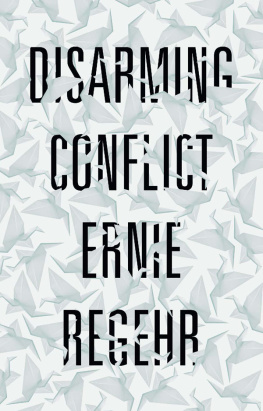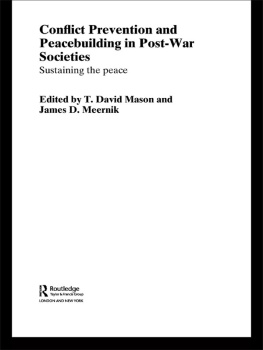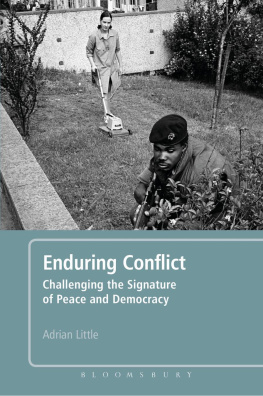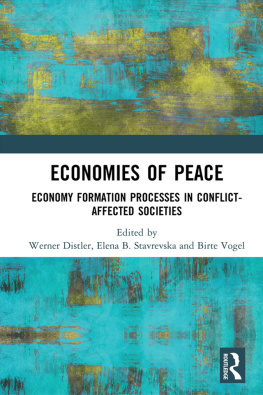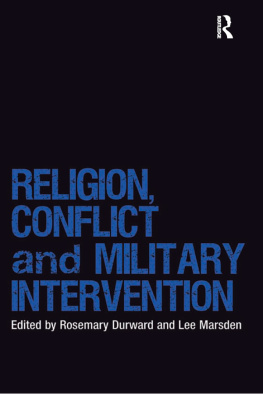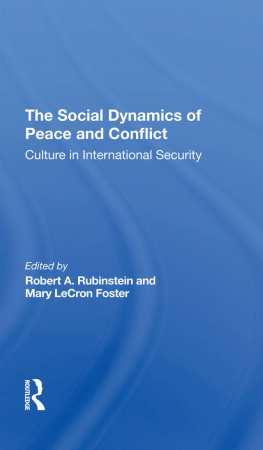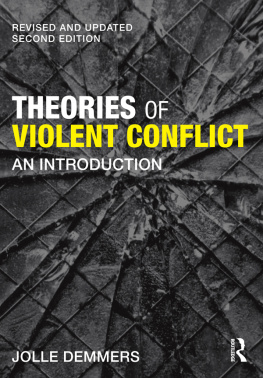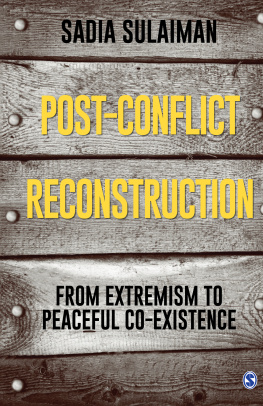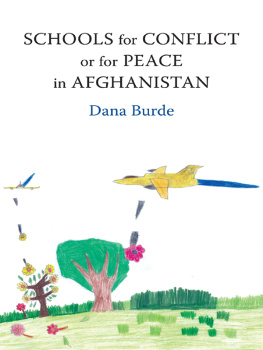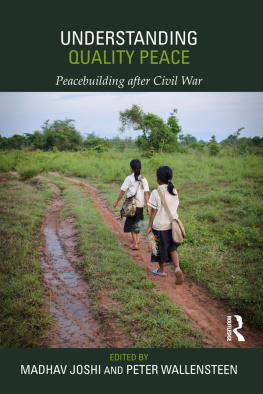
More praise for
Disarming Conflict
Disarming Conflict is warmly recommended for those who still cling to the stereotypes of dreamily idealistic peaceniks and hard-nosed warriors for after reading Regehrs calm, rigorous, and utterly persuasive analysis, they will find their worldview permanently and usefully unsettled.
IAN MCKAY, QUEENS UNIVERSITY
Powerful, comprehensive, and eminently practical
PEGGYMASON, PRESIDENT OF RIDEAU INSTITUTE
Regehr brings a wealth of knowledge and many years of thought to the issue of conflict and gives us a powerful counter to the deeply embedded assumption that there are seldom alternatives to war.
PAUL ROGERS, BRADFORD UNIVERSITY
Regehrs in-depth explanation of conflicts around the world is both informative and fascinating.
SANDRA RUCH, NATIONAL COORDINATOR, CANADIAN VOICE OF WOMEN FOR PEACE
An indispensable read for all people who desire peace.
HEATHER EATON, SAINT PAUL UNIVERSITY
A solid critique of the futility of war. Leaders around the globe would be well advised to heed its call for conflict-prevention strategies and a sustained investment in the peaceful settlement of disputes.
PAUL MEYER, SIMON FRASER UNIVERSITY
About the author
Ernie Regehr OC is co-founder of Project Ploughshares, one of Canadas leading peace and security NGOs. He is also Senior Fellow in Arctic Security at The Simons Foundation of Vancouver, and Research Fellow at the Institute of Peace and Conflict Studies, Conrad Grebel University College, the University of Waterloo. Ernie has served as an NGO representative and expert advisor on numerous Government of Canada delegations to multilateral disarmament forums, including Review Conferences of the Nuclear Non-Proliferation Treaty and UN Conferences on Small Arms. In 199091 he was Canadas representative on the United Nations Group of Governmental Experts on Arms Transfer Transparency that led to the creation in 1992 of the UN Conventional Arms Register, and in 2001 was an advisor to the Government of Kenya in the development of a regional arms control agreement on small arms, known as the Nairobi Declaration. He has traveled frequently to conflict zones, especially in East Africa, contributed to Track II diplomacy efforts related to the war in southern Sudan, and is on the Board of the Africa Peace Forum of Nairobi, Kenya. He is a former Commissioner of the World Council of Churches Commission on International Affairs, where he was active in developing the WCCs position on Responsibility to Protect as adopted at the 2006 World Assembly.
Disarming Conflict
Ernie Regehr

Disarming Conflict was published in 2015 by Zed Books Ltd,
The Foundry, 17 Oval Way, London SE11 5RR, UK
www.zedbooks.co.uk
First published in Canada in 2015 by Between the Lines,
401 Richmond Street West, Studio 277, Toronto, Ontario M5V 3A8.
www.btlbooks.com
Copyright 2015 Ernie Regehr
The right of Ernie Regehr to be identified as the author of this work has been asserted by him in accordance with the Copyright, Designs and Patents Act, 1988
Text design and page preparation by Steve Izma
Cover design by Jonathan Pelham
All rights reserved. No part of this publication may be reproduced, stored in a retrieval system or transmitted in any form or by any means, electronic, mechanical, photocopying or otherwise, without the prior permission of Zed Books Ltd.
ISBN 978-1-78360-355-8 hb
ISBN 978-1-78360-354-1 pb
ISBN 978-1-78360-356-5 pdf
ISBN 978-1-78360-357-2 epub
ISBN 978-1-78360-358-9 mobi
To Nathan, Clem, Erin, and Mabel
Contents
Preface and Acknowledgements
R EADERS WILL NOT BE AT A LOSS to identify the point of view that animates this volume. You dont spend the better part of four decades in and around an organization dedicated to beating swords into ploughshares and then claim to come at the subject of peace and war without recourse to some pretty strong convictions. But bringing convictions to a project doesnt mean leaving the evidence behind. Peace, no less than politics, is the art of the possible. So, while a deep wariness of the utility of military force in settling highly complex political disputes certainly informs this volume and, by the way, is not out of place in any serious exploration of what underpins durable peace and stability, policy must finally be guided more by what actually works than by deep convictions about what ought to work.
A central contemporary challenge facing governments when they try to respond effectively to political conflict gone violent, or that threatens to do so, is for them to meet head on the tenacious conviction about the efficacy of war that still trumps the evidence of the past twenty-five years of armed conflict. Since the end of the Cold War the world has witnessed a succession of spectacularly failed wars, and yet public policy in far too many capitals still reflects the persistent but unsubstantiated conviction that it is the vigorous preparation for war, and from time to time the forceful prosecution of it, that produces durable peace. That the world now spends $1.7 trillion annually on armed forces an amount roughly equal to the gross domestic output of all of Africa is but one of the gloomier indications that assumptions about the force of arms as the final guarantor of peace and security remain prominent. But the evidence of the past twenty-five years of armed conflict points in another direction. To favour diplomacy and peacebuilding over military prowess as the more reliable means to durable peace turns out to be founded on practical realism as much as conviction.
Anecdotal evidence of the limits to force fills daily news reports, but there are also more systematic compilations of such evidence. Project Ploughshares has maintained a database on the worlds wars since 1987 and it serves as a primary source for what follows. Other corroborating sources on trends in armed conflict that are consulted include the Stockholm International Peace Research Institute, the Uppsala Universitys Department of Peace and Conflict Research, and the Human Security Report Project at Canadas Simon Fraser University. The definitions of war or armed conflict these terms are used interchangeably are drawn from the annual Project Ploughshares armed conflicts report, and conflict descriptions also rely heavily on the work of Project Ploughshares.
That means in turn that Project Ploughshares, led until mid-2015 by Executive Director John Siebert and since then by Cesar Jaramillo in the same role, tops the list of the organizations and individuals whose help has been immeasurable in completing this work. Two past chairs of the Ploughshares board, Moira Hutchison and Dona Harvey, unfailingly wise advisors and supportive friends, were especially important in supporting the idea of this project and then encouraging its completion. Dr. Jennifer Simons, President of The Simons Foundation, has also been a trusted friend and advisor, and the foundation has provided critically important financial support, both to Project Ploughshares and for this project.
Im also especially grateful to my good friend Gerry Barr for suggesting the theme for this book and for encouraging me to stick with it. Douglas Roche, Murray Thomson, and Bev Delong are three friends and valued comrades, not in arms, but in disarmament. We have worked together on multiple projects and their wise counsel and support on many issues and activities have been indispensable.
A special thank you to Christina Woolner for her valuable research assistance on this project. I have had the benefit of critical commentary from a number of readers of various sections of the text, and Im indebted to Ken Epps, Cesar Jaramillo, and Tasneem Jamal, valued colleagues at Project Ploughshares, for their insights, support, and advice. Im also especially grateful to other readers: Branka Marijan, Paul Meyer, Greg Puley, Mark Sedra, Jamie Swift, and Andrew Thompson. All offered important advice, pointed out errors, and made valuable suggestions.
Next page
